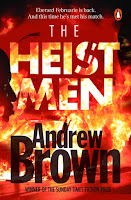Michael - Thursday
Most followers of Murder Is Everywhere probably know that I do a monthly piece for the International Thriller Writers’ e-magazine (which rejoices in the name of The Big Thrill) called Africa Scene. Each article features an author with a new mystery/thriller novel set largely somewhere in Africa, and the idea is to display the rich variety of work that is coming out of a range of African countries. Sometimes the books are written by authors not living in Africa, but engaged with Africa in a deep way.
Having just set up the November piece, I suddenly realized
two things about 2022 so far – one good
and one not so good. The good one is that it’s been a bumper year for South
Africa (actually southern Africa, including Botswana). We’ve had a remarkable
suite of new novels from new and established South African authors and they’ve
picked up almost all the slots this year. The bad thing, of course, is the other side of that coin - where are all
the mystery/thrillers set further north? We’ve had some stunners over the last few years, but suddenly
there’s a dearth. I’m always on the lookout for them, but either I’m doing a
bad job or this has been a rather dry year.
So let’s get back to the good news. I’ll just focus on the
themes because the spread suggests that SA crime fiction is spreading out from its focus on the Apartheid past. However, I’ve included the Africa Scene link if you’d like to find
out more about the author and the book.
February: Outside the Lines by Ameera Patel
April: The Dark
Flood by Deon Meyer
May: Serpent Crescent by Vivian de Klerk
For something completely different, Vivian gives us a protagonist who is a sociopath – now an elderly woman living alone in a house in Serpent Crescent in a town based on a university city in the Eastern Cape - who tells us the story of her life. Part of the attraction of the book is the in-depth look at how such a personality develops, and learns to protect itself, but there are many twists and turns along the way.July: The Milk Tart
Murders by Sally Andrew
The Milk Tart Murders is Sally’s fourth mystery featuring the delightful Tannie Maria. Set in Ladismith in the Klein Karoo, Maria works for the Klein Karoo Gazette writing a love advice and recipe column. She lives outside town with her hens and her flowers, and is a superb cook. As usual, the book is dotted with delicious recipes, a selection of which are given in detail at the end of the book. If you haven’t met Tannie Maria before, you should do so, and you should try out some of those recipes. The first book is now a prime time TV series. I just can’t work out why Tannie Maria becomes Scottish for the role...
September: A Deadly
Covenant by Michael Stanley
The book is now out as an ebook worldwide.
October: The Heist
Men by Andrew Brown
The Heist Men is a thriller around a gang that attacks and robs cash-in-transit vehicles—a modern-day scourge in South Africa. The tension comes from two directions—on the one hand we follow Captain Eberard Februarie of the SA Police Service in his efforts to track down the gang, but on the other we follow Andile Xaba, the leader of a crew of heist men who sees his activities with the gang as a career. He leads a double life with a suburban girlfriend and township mother. Despite his role in the gang, he grabs our interest and wins our sympathy.
November: The Eye
of the Beholder by Margie Orford (Next month.)
This weekend you can catch up with Stan for the last three A Deadly Covenant launch events in the Twin Cities:
Friday 14, 10 am
Lake Country Booksellers event
4766 Washington Ave,
White Bear Lake, MN 55110 Phone:651-426-0918
Saturday 15, 10:00 am – 5:00
pm
Twin Cities Book Festival
Join Stan to chat about books, Botswana and Bushmen at this great annual event!
Minnesota State Fairgrounds, Saint Paul, Minnesota
Sunday 16, 1:00 pm – 2:00 pm
Barnes and Noble,


























